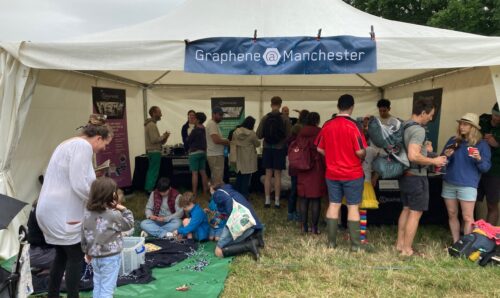Creating an ‘Industrial Strategy’ for advanced materials will power the northern and UK economies
Collaborations 23 May 2018
James Baker, CEO of Graphene@Manchester, believes the strategic investment being made in Manchester to underpin its advanced materials capability has the potential to create a global economic powerhouse. James will co-host a round table at the forthcoming FT UK Business Conference Opportunities for Future Growth in the North organised by Financial Times LIVE.
The future of manufacturing is facing a brave new world of innovation and creative disruption.
In the UK we need to tackle huge challenges, such as the electrification of the nation’s automotive fleet; the need to radically transform battery technology; and the quest for ever more resilient, sustainable and lighter materials.
Creating new and smarter advanced materials will be critical to our success – and the global expertise in this field is based here, at the heart of the Northern Powerhouse.
This advantage provides a fantastic opportunity to drive growth in our region by exporting world-beating knowledge and products to a global marketplace. But to achieve our full potential we need to be focused on an industrial strategy for advanced materials.
The Government’s national Industrial Strategy is built on five pillars: ideas, people, infrastructure, business environment and places.
I absolutely believe this region is already the best place for applied research in advanced materials. The massive, multi-million pound investment we are making to create world-class research infrastructure which, in turn, is attracting the very best people in the field of advanced materials. These brilliant minds are generating the best ideas and new knowledge to provide competitive advantage.
Critically, all this resource is looking to the needs of the business environment and the translation of research into real world commercial solutions. An example of this approach is the soon-to-open Graphene Engineering Innovation Centre (GEIC), which is based at The University of Manchester. This £60million Centre will accelerate the commercial pace of graphene and 2D materials in Manchester, across the wider region and beyond.
The GEIC will focus on industry-led application development in partnership with academics and aims to fill a critical gap in the graphene and 2D materials ecosystem by providing facilities that focus on pilot production, materials characterisation, together with application development in composites, energy, solution formulations and coatings, electronics and membranes.
Along with the National Graphene Institute and the £105million Henry Royce Institute building – set to be completed in 2019 – the GEIC will be crucial in maintaining the UK’s world leading position in advanced materials.
The GEIC will also act as the cornerstone of the University’s vision to create a Graphene City in the heart of Manchester, made up of scientists, manufacturers, engineers, innovators, investors and industrialists to build a thriving knowledge-based economy.
This unique community of experts and world-class facilities has the potential to transform the region’s fortunes, especially if we can underpin it with other new ideas associated with Industry 4.0. For example, I was very excited about the proposals made recently by Jürgen Maier, CEO of Siemens UK and an honorary professor at The University of Manchester.
Jürgen has proposed the ‘made smarter’ concept of advanced digital technologies, including robotics, 3D printing, augmented and virtual reality as well as artificial intelligence. By building a national digital ecosystem, piloted in the North-West, smaller and medium-sized engineering companies would have the chance to go to a physical space to experiment with new technologies and see how they might be applied to a process in their own factories.
This pioneering spirit – which kick-started the first Industrial Revolution in the North-West – will help harness this region’s expertise in advance materials and make us a powerhouse of innovation and commercialisation.
2D MaterialsAdvanced materialsapplicationscarscollaborationcommercialisationGEICgrapheneGraphene CityJames BakerManchesterNational Graphene InstituteNorthern PowerhouseRoyce InstituteThe University of Manchester




